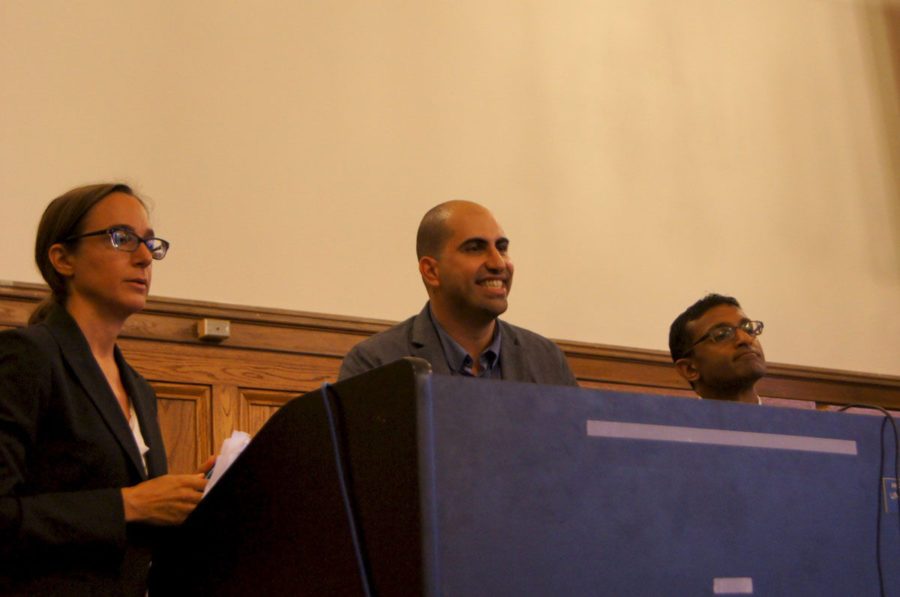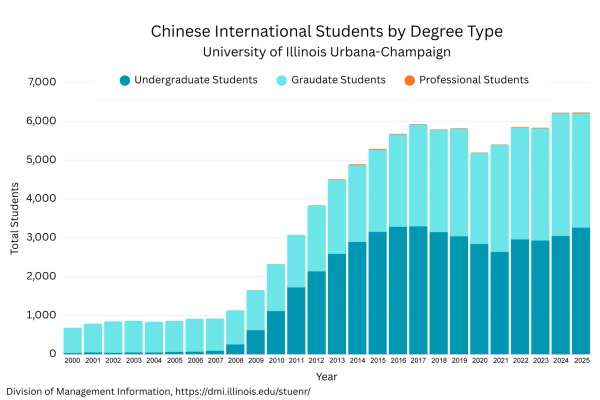Salaita wants reinstatement or will pursue legal action
Sep 10, 2014
Last updated on May 11, 2016 at 02:47 a.m.
Despite recent controversy, Salaita confirmed at a press conference Tuesday that he still wants to pursue a teaching position at the University.
Hundreds of Salaita supporters filled the YMCA, 1001 S. Wright St., where Salaita made his first public statement.
“I reiterate the demand that the University recognize the importance of respecting the faculty’s hiring decision and reinstate me,” Salaita said.
When asked why he would want to be reinstated to the University, Salaita addressed his supporters, “the answer is in this room.”
Get The Daily Illini in your inbox!
On Thursday, Sept. 4, Chancellor Phyllis Wise told College of Media faculty that there is no chance he will teach on campus. Anand Swaminathan, an attorney representing Salaita, said that if the board does not approve Salaita, he is prepared to pursue legal action.
When asked, Swaminathan said at the moment Salaita was not considering a financial settlement from the University.
“(Salaita’s) goal is to be reinstated at the University,” he said.
Last week, Wise said she thought she had done the right thing when she warned Salaita that his appointment would not be forwarded to the Board of Trustees roughly two weeks before the semester began; However, Salaita said it wasn’t time enough.
“…my family has no income, no health insurance and no home of our own,” he said. “Our young son has been left without a preschool.”
Both Salaita and his wife resigned positions from Virginia Tech University, sold their home and “took on considerable expense in preparation for our move here.”
Wise said she did not forward the appointment on to the Board of Trustees, which meets Thursday, Sept. 11. It is unclear whether the Board will address Salaita’s appointment.
The YMCA was filled with students, faculty and community members who came following a student-led walkout at 11:30 a.m. outside the Illini Union.
Salaita spoke about his tweets, which he believes were “critical of recent Israeli human rights violations,” but which Wise described as “uncivil.”
On the topic of his controversial tweets, Salaita asserted that labeling his tweets as “uncivil” is “highly subjective” and sets a dangerous precedent for future faculty members with unconventional beliefs.
“My comments were not made in a classroom or on campus; they were made through my personal Twitter account,” Salaita said. “The University’s policing and judgment of those messages places any faculty member at risk of termination if University administrators deem the tone or content of his or her speech ‘uncivil.’”
Salaita also stated that he stood by the language he used in the tweets that stirred up both anger and support from students and faculty nationwide.
“My Twitter messages are no doubt passionate and unfiltered; they reflect my deep dismay at the deaths of more than 2,000 innocent Palestinians, over 500 of them children,” Salaita said.
He addressed recent allegations against the University’s decision being influenced by donors, stating he believes his rescinded position is part of a larger movement by wealthy “pro-Israel” individuals and organizations to limit opposition against their political beliefs.
“This risks creating a Palestinian exception to the First Amendment and to academic freedom,” said Salaita. “The ability of wealthy donors and the politically powerful to create exceptions to bedrock principles should be worrying to all scholars and teachers.”
Salaita concluded his remarks by expressing his gratitude to the University students and faculty who supported him over the course of the last month.
“I am deeply grateful to the many hundreds of people and prominent organizations who have raised their voices in defense of the principles of academic freedom, including the nearly 18,000 individuals who have signed a petition demanding corrective action and the numerous faculty around the world who are boycotting the University until I am reinstated,” Salaita said in closing. “This is, as we say in my profession, a ‘teaching moment.’ We must all strive together to make the most of it.”
Campus Spokeswoman Robin Kaler reaffirmed the administration’s commitment to Wise’s decision, as well as their dedication to providing students with a “world-class” education.
“While the University stands by the decision not to hire Professor Salaita, we will continue to welcome all speakers to our campus,” said Kaler. “We remain devoted to fostering a campus-wide dialogue on the most uncomfortable issues that are vital to our very foundation and will continue to work closely with our students, faculty and staff to nurture an environment where all issues, including the most complicated ones, can be discussed.”
Following Salaita’s statement, Robert Warrior, director of the American Indian Studies program, took to the podium and explained that his department’s decision to issue a vote of no confidence in Chancellor Wise was based on his commitment to academic freedom.
“It wasn’t a political decision,” said Warrior. “It was a decision based on our idea that (the University) needs to be a more excellent place.”
Warrior discussed his frustration with Wise over her decision, expressing his belief that she may have made a different decision if she had sat down with Salaita herself.
“I hope, Chancellor Wise, that you have a face-to-face conversation with Steven Salaita someday … because I know that if you ever do sit down with him face-to-face, you will find him to be, as I have known him to be, a person that is engaging … who would never step into a classroom to try to impose an agenda on other people,” Warrior said.
Following Warrior’s remarks, Michael Rothberg, head of the English Department, spoke on behalf of the Modern Language Association, MLA, to issue a statement on the organization’s behalf.
“The MLA calls on Wise and the Board of Trustees to redress what seems to be an unjust decision,” said Rothberg.
Student supporters of Salaita, Rico Kleinstein Chenyek and Eman Ghanayem, spoke following Rothberg’s statement, asserting that their academic growth had been jeopardized by the University’s decision not to hire Salaita. Salaita also answered questions from the media and reaffirmed his wish to teach at the University.
“I have lost the great achievement of a scholarly career — lifetime tenure, with its promised protections of academic freedom,” Salaita said.
Josh can be reached at [email protected].






